|
Volume I
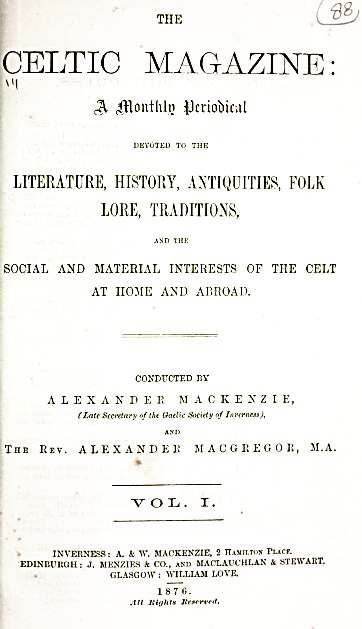
Introduction to
Volume I.
IN the circular issued,
announcing the CELTIC MAGAZINE, we stated that it was to be a Monthly
Periodical, written in English, devoted to the Literature, History,
Antiquities, Traditions, Folklore, and the Social and Material Interests
of the Celt at Home and Abroad: that it would be devoted to Celtic
subjects generally, and not merely to questions affecting the Scottish
Highlands: that it would aii'ord Reviews of Books on subjects
interesting to the Celtic Races—their Literature, questions affecting
the Land—such as Hypothec, Entail, Tenant-Right, Sport, Emigration,
Reclamation, and all questions affecting the Landlords, Tenants, and
Commerce of the Highlands. We will also, from time to time, supply
Biographical Sketches of eminent Celts at Home and Abroad, and all the
Old Legends connected with the Highlands, as far as we can procure them,
beginning with those of Inverness and Ross shires.
We believe that, under
the wiser and more enlightened management now developing itself, there
is room enough in the Highlands for more Men, more Land under
cultivation, more Sheep and more Shepherds, without any diminution of
Sport in Grouse or Deer: that there is room enough for all—for more
gallant defenders of our country in time of need, for more produce, more
comfort, and more intelligence. We shall afford a medium for giving
expression to these views. When submitting the first number of the
Magazine to the public, we think it proper to indicate our own opinion
on these questions at greater length than we could possibly do in a
circular; but, while doing this, we wish it to be understood that we
shall at all times be ready to receive contributions on both sides, the
only conditions being that they be well and temperately written, and
that no side of a question will obtain undue prominence—facts and
arguments alone allowed to work conviction. Thus, Ave hope to make the
Celtic Magazine a mirror of the intelligent opinion of the Highlands,
and of all those interested in its prosperity and progress.
In dealing with Celtic
Literature, Antiquities, Traditions, and Folklore, we must necessarily
be Conservative. It is impossible for a good Celt to be otherwise than
conservative of the noble History of his Ancestors—in love and in war,
in devotion and daring. If any should deem this feeling on our part a
failing, we promise to have something to say for ourselves in future,
and not only give a reason for our faith, but show that we have
something in the Highlands worth conserving.
In dealing with the
important question of Sport, we cannot help taking a common sense view
of it. We cannot resist the glaring facts which, staring us in the face,
conclusively prove that the enormous progress made in the Highlands
during the last half century, and now rapidly going on, is mainly due to
our Highland Sports. A great amount of nonsense has been said and
written on this question, and an attempt made to hold grouse and deer
responsible for the cruel evictions which have taken place in the North.
Arguments, to be of any force, must be founded on facts; and the facts
are, in this case, that it was not grouse or deer which caused the
Highland evictions, but sheep and south country sheep farmers. The
question must be argued as one not between men and deer, but between men
and sheep, and sheep against deer. We believe there is room enough for
all under proper restrictions, and, to make room for more men, these
restrictions should be applied to sheep or deer.
We believe that it would
be a wise and profitable policy for Landlords as well as for Tenants to
abolish Hypothee and Entail, and to grant compensation for improvements
made by the latter. We are quite satisfied from experience, that the
small crofter is quite incapable of profitably reclaiming much of our
Highland Wastes without capital, and at the same time bring, up a
family. If he is possessed of the necessary capital, he can employ it
much more advantageously elsewhere. The landlord is the only one who can
reclaim to advantage, and he can hardly be expected to do so on an
entailed estate, for the benefit of his successors, at an enormous rate
of interest, payable out of his life-rent. If we are to reclaim
successfully and to any extent, Entail must go; and the estates will
then be justly burdened with the money laid out in their permanent
improvement. The proprietor in possession will have an interest in
improving the estate for himself and for his successors, and the latter,
who will reap the greatest benefit, will have to pay the largest share
of the cost.
Regarding Emigration, we
have a matured opinion that while it is a calamity for the country
generally, and for employers of labour and farmers in particular that
able-bodied men and women should be leaving the country in their
thousands, we unhesitatingly assert that it is far wiser for these men
and women to emigrate to countries where their labour is of real value
to them, and where they can spend it improving land which will not only
be found profitable during their lives, but which will be their own and
their descendants freehold for ever, than to continue starving
themselves and their children on barren patches and crofts of four or
five acres of unproductive land in the Highlands. We have experienced
all the charms of a Highland croft, as one of a large family, and we
unhesitatingly say, that we cannot recommend it to any able-bodied
person who can leave it for a more promising outlet for himself and
family. While we are of this opinion regarding voluntary emigration, we
have no hesitation in designating forced evictions by landlords as a
crime deserving the reprobation of all honest men.
We shall also have
something to say regarding the Commercial Interests of the
Highlands--its trade and manufactures, and the abominable system of long
Credit which is, and has proved, so ruinous to the tradesman; and which,
at the same time, necessarily enhances the price of all goods and
provisions to the retail cash buyer and prompt payer. on all these
questions, and many others, we shall from time to time give our views at
further length, as well as the views of those who differ from us. We
shall, at least, spare no effort to deserve success.
The HIGHLAND CEILIDH will
be commenced in the next number, and continued from month to month.
Under this heading will be given Highland Legends, Old Unpublished
Gaelic Poetry, Riddles, Proverbs, Traditions, and Folk-Lore.
Volume I
Volume II
Volume III
Northern Folk-Lore
On Wells and Water, An Account of some interesting wells in the
Neighbourhood of Inverness and the North by Alex. Fraser (1878) (pdf)
Volume IV
Volume V
Volume VI
Volume VII
Volume VIII
Volume IX
Volume X
Volume XI
Volume XII
Volume XIII
The Celtic
Monthly
Volume XIV
Volume XVI
Volume XIX
Volume X
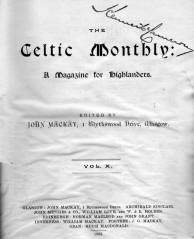
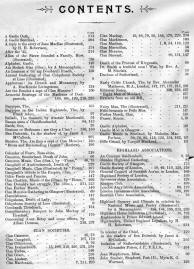
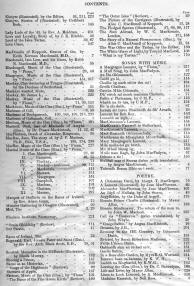
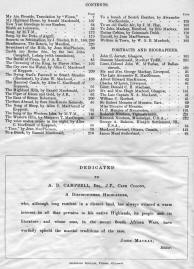
-
October 1901
As well as Gaelic poems and their
translations there are also articles on MacLeans of Gallanach, Coll,
Gaelic Mod in Glasgow, Simon Fraser, Tenth Lord Lovat, The Graves of the
Keppochs, The MacLeans of Coll, Clan Colquhoun Society annual gathering
at Luss, Neil MacLeod, last of the MacLeods of Assynt, Highland Home
Industries, etc.
-
November 1901
George MacKay, President of the Clan MacKay Society, Neil MacLeod last
of the MacLeods of Assynt, Martial music of the clans, Clam MacKay
gathering at Tongue, The Ossianic Ballads, Simon Fraser, 10th Lord Lovat,
etc.
-
December 1901
William C. MacLeod, Neil MacLeod last of the MacLeods of Assynt, The
Martial Music of the Clans, The MacLeans of Coll, Kintyre on Emigration
and Depopulation, Iain Lom and his Times, The Scot Abroad, A Mull Song,
The Fledged Sporan - a tale of Terror from the Gaelic, Gaelic Music in
Scotland, Death of John Cameron of Sutherland.
-
January 1902
Charles M'Laren Liverpool, Albert Edward MacKinnon, The Song of Sleep,
The Piper of Golf and Green, A Christmas and New Year Greeting, The
Pledged Sporran, Clan Menzies Gathering, Martian Music of the Clans, The
Marquis of Dufferin on the Races of Ireland, Gaelic Music in Scotland,
Rognvald: Earl, Jorsala-Farer and Saint.
-
February 1902
James Mead Sutherland, Am Bodach Glas (The Grey Spectre), Banais Anns A'
Ghaidhealtachd, Gaelic Music in Scotland, The Pledged Sporran, Rognvald:
Earl - Jorsala-Farer and Saint, The Haunted Castle, The Stewart Society,
The Bagpipes in the Indian Highlands, London Argyllshire Association,
The Martian Music of the Clans.
-
March 1902
D. P. Menzies, FSA Scot of Menzieston, The isolation of Sutherlandshire,
My Highland Home, Alexander MacPherson, The White Glave of Light, The
Martial Music of the Clans, Banais Anns A' Ghaidhealtachd, Gaelic Music
in Scotland, The Pledged Sporran.
-
April 1902
MacLeod Stewart Ottawa Canada, Gaelic Music in Scotland, Applecross: Its
church and monastery, John Sinclair, Shepherd Part III, Are the Benzies
a sept of Clan Menzies, The Beatons or Bethunes, The Martial Music of
the Clans, Comhradh Tirisdeach, How Allan-of-the-Straw founded a family
- A tale of the MacLeans of Torloisk, The story of Jane MacRae, Sonnets
on Schiehallion, The song of the Western Seas, Clan Forbes March.
-
May
1902
Hugh MacLeod of Glasgow, Scottish Memories in the Midlands, Stories of
Kintyre, Celtic Facts and Fancies, The Early Celtic Church, The Highland
Hills, The Martial Music of the Clans, Gaelic Music in Scotland, Evening
in the Hill Country, Highland Scenery and Climate in Relation to
National Music and Poetry, Bonnie Prince Charlie, An Leannan A Bh' Aig
Domhnull Ruadh, Armorial Bearings of MacLeans of Dochharroch.
-
June
1902
John G. Jarratt, Laoidh na Rioghachd (The National Anthem), Gaelic Music
in Scotland, Highland Scenery and Climate in Relation to National Music
and Poetry, The Martial Music of the Clans, Leaving the Glen, What is my
Tartan?, The Scot Abroad, The Story of Jane MacRae, To a Bunch of Scotch
Heather, The Early Celtic Church, London Argyllshire Association, Unitas
Celtica, The War Office and the Tartans.
-
July
1902
Lieut.-Colonel John W. M'Farlan of Ballancleroch, Gaelic Music in
Scotland, The Scot Abroad, The Dying Gael's Farewell to Strath Strathie,
Armorial Bearings of MacLean of Dochgarroch, Tp John MacKay of Hereford,
The Martial Music of the Clans, Gillecriosd, Highland Scenery and
Climate in relation to National Music and Poetry, The Early Celtic
Church, Highland Society of London, The Rant of Struan Robertson.
-
August 1902
Duncan MacDonald, Merthyr-Tydfil, Dreams, The Martial Music of the
Clans, In the Shadow of Ben Duirnish, The Cry Over the Waters, Clan
Donnachaidh Society, The Fairy Man, Highland Scenery and Climate in
Relation to National Music and Poetr, In a Rosh-Shire Garden, A Gaelic
Oath, The Early Celtic Church, A MacGregor Lament, Armorial Bearings of
MacLean of Dochgarroch, Concerning Aunt Betsy and Some Others, The Clan
Donnachaidh.
-
September 1902
The Nicolson Institute Stornaway, Evicted, The Fairy Man, The Return of
the Men to "Bonnie Strathnaver", The Martial Music of the Clans,
Strathnaver: The Return, Skene as an Historian, Lady Lude of the "Forty
Five", Armorial Bearings of MacLean of Dochgarroch, Highlanders - United
England Loyalists, The Early Celtic Church, Concerning Aunt Betsy and
Some Others, Highland Scenery and Climate in Relation to National Music
and Poetry.
-
Volume XI
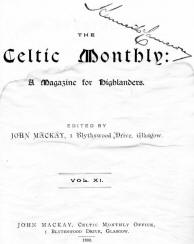
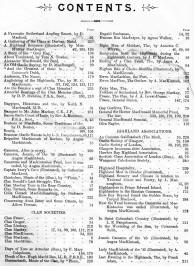
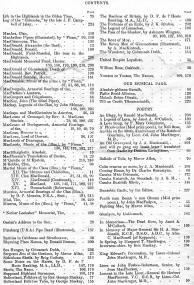
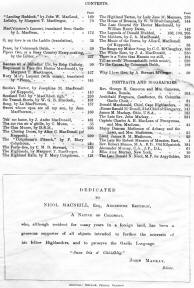
-
October 1902
Sir Robert Menzies of Menzies - Baronet, King Edward's Coronation,
Captain Ivory's Cave, The Highlands, The Fairy Man, Lament for Roderick
"The Chisholm", Baron-Bailie Court of Lude, Highland Mod at Dundee, The
Martial Music of the Clans, Highland Scenery and Climate, Concerning
Aunt Betsy and Some Others, Duncan Ban MacIntyre, Emigrations from the
Highlands during the Eighteenth Century, Armorial Bearings of MacLean of
Dochgarroch, An Old Gaelic Saying.
-
November 1902
Matheson of Shiness, Achany and The Lews, Sergeant Jim of the Gordons,
Mackays and Mackintoshes in America, Highland Scenery and Climate,
"Rarities in Caithness and Strathnaer, Histories of the Bagpipes,
MacLean Lord of Dowart, The Martial Music of the Clans, Mod prize poem,
The Eight Men of Moidart.
-
December 1902
Captain Charles. H. MacLean, Scottish Clans Association of London, Lady
MacKintosh of the '45, Lament to the Late Lieut-Gen. Sir Herbert
MacPherson, The Martial Music of the Clans, MacKays and MacKintoshes in
America, About Tomintoul, In the Westering of the Sun, Coming Home.
-
January 1903
Alexander Murray, The Clan Fraser, Some remarks on Clan Tartans, The
ending of a clan feud, The Martial Music of the Clans, The eight men of
Moidart, MacLeans of Dochgarroch, A balad of Yule, The Distinctions of
the Ossianic Poems, Brigadier MacKintosh of Borlum, Life in the
Highlands in the olden times, Folklore of Sutherland, The MacLeans of
Crossapol, Clan MacMillan Society, Our musical page.
-
February 1903
Archibald Fergusson, A Highland Romance, Jennie Cameron of the '45,
Gaelic names in Braemar, An Ode on the 300th anniversary of the Battle
of Glenfruin, A favourite Sutherland Angling resort, The Pass of the
Shadow, The MacLeans of Crossapol, The Anglicising of the Highlands, The
Eight Men of Moidart, The Martial Music of the Clans.
-
March 1903
The Camerons of Worcester, Rev. George H. Cameron of Russia, The
anglicising of the Highlands, There is a voice that haunts me still, A
Highland Romance, The Pass of the Shadow, Macara Clan, Glen Eagles, The
Seven Men of Glenmoriston, The Wanderer, Place Names in Braemar, The
Martial Music of the Clans, Some Traditions of the Beatons or MacBeths,
Our Musical page.
-
April 1903
James M M;Kay Ohio USA, The Highland Exile, How the Feud between the
Camerons and MacKintoshes ended, The Anglicising of the Highlands, A
Highland Romance, The Pass of the Shadow, The Late General Sir Hector
MacDonald, In Saint Columba's Country, The Martial Music of the Clans,
Reminisceses of Strathnaver.
-
May
1903
AEnas Ranald McDonell 21st Chief of Glengarry, Fighting Mac, The Eagle,
The House of Dreams, The Martial Music of the Clans, Some Notes on the
Harris, General Hector A. MacDonald, The General MacDonald Scandel, The
Anglicising of the Highlands, Sutherland Folk-Lore Tales, Pittsburg
U.S.A. Pipe Band, Days of Yore at Arrochar.
-
June
1903
Donald McDonald Chief Cape Highland Society, Tak' Me Hame, Ewen MacPhee
the Outlaw, And the greatest of these is..., Legends of the Clan MacKay,
Landing Haddook, Hector MacDonald Memorial, The Name Anderson, The
Martial Music of the Clans, The Anglicising of the Highlands, Death of
General Fraser, Highlanders in the Russian Caucasus, Some Notes on the
Harris, Days of Yore at Arrochar, The Sangs my Mither Sung.
-
July
1903
Rev. Robert Munro, The Martial Music of the Clans, GlenLyon, How Boy
Beyond found the Golden Beam, The Pass of the Shadow, Our Musical Page,
The Legend of Lorn, Clan Menzies Armorial Bearings, The Basileus of
Britain, The Legend of Lianachan or a story of the "Grey Hag", The
MacLeans of Crossapol, Donald Diabhul, Rhyming Place Names.
-
August 1903
The Late Donald N Nicol, An Old Graveyard, Alice Cameron,
Inverness-Shire, Legends of the Clan MacKay, Tour of His Excellency
Field Marshall MacDonald, The Closing Doors, The Last Evening in the
Highlands, Clan Menzies Armorial Bearings, The Duart Coat of Arms,
Sithichean Shelia, The Martial Music of the Clans, The Pass of the
Shadow, The "Colquhouns Peabroch", The "Nether Lochaber" Memorial.
-
September 1903
The Late Rev. John MacKay, Colla Ciotach Mac Ghilleasbuig, Log of the "Columba",
Death of MacDonald of Glenaladale, Pipers Two or A Reay Country
Merry-Making, Dunrobin Castle, The Martial Music of the Clans, A
Gathering of the Clans at Durban Natal, History of the Outer Hebrides,
Gaelic Society of London, The Fortunes of an Exile, The Clan Munro, Sea
Hunger, The MacLeans of Crossapol, An Elegy, Highland Hospitality,
Wanganui Caledonian Society, M'Quistan or M'Eystein, The Mothers.
Volume XX
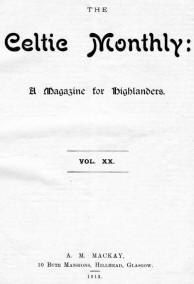
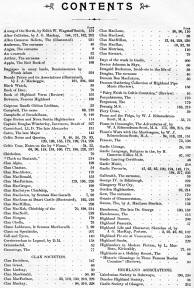
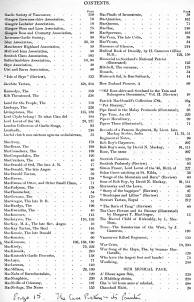
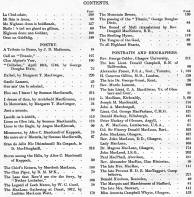
-
January 1912
Alexander Fraser FSA Scot Toronto, Sketches of Highland Life and
Character, The Marvel Child of Kircauldy - L. MacBean, The Clan MacLaren,
Celtic Notes and Queries, Records of a Famous Regiment - The 93d
Sutherland Highlanders, Muireach Fail, The Cave Picture and its Painter,
The Late Mr. A MacDonald of Ord, A Tribute to Burns, The Clan MacRae
Societyy, Our Musical Page, Lord Lovat of the '45.
-
February 1912
The Late Lieut. C. A. MacAlister of Glenbarr and Cour, Sketches of
Highland Life and Character, Gaelic Coinage, Caiptean Ruadh Ghlinn
Liobhan, Gaelic Lament, Gordon Highlanders, The Late Dr. George Grant,
The Highlander of Modern Fiction, MacMillan, Just a Minute, Records of a
Famous Regiment - The 93rd Sutherland Highlanders, The Clan M'Farlane
Society, The Highlands, Notes on The Celtic Year, The Highlands as a
Holiday Resort, The Story of the Bagpipe, MacPhail of Inverairnie, Storm
among the Hills, Incidents in the Life of Dugald Buchanan, The Surname
Douglas, Celtic Notes and Queries.
-
March 1912
Mr Peter Mackay Glenure Argyll, Sketches of Highland Life and Character,
Gaelic Proverbs, The Highlander in Modern Fiction, The Gaelic Leaving
Certificate, Mr Donald Nicolson of Bearsden, The 93rd Sutherland
Highlanders, Notes on the Celtic Year, Celtic Notes and Queries, Fionn
and the Fidga, Solan Geese catching at St. Kilda, The Late Mr. D. R.
MacGregor Melbourne, Highland Funerals, The Legend of Loch Maree,
MacDonald Tartans, The Surname Galbraith, Our Musical Page.
-
April 1912
Mr A. W. M'Lean - Lumberton North Carolina USA, Sketches of Highland
Life and Character, Gaelic Proverbs, Mr L. MacBean of Kirkcaldy, Notes
on the Celtic Year, A New Zealand Pioneer, The Clan Piper, The MacEwans
of Ottir and Other Small Clans - The MacLays, The MacQueens, "Culloden,
April 16th 1746, Who have the Largest Heads and Feet?, Pipers Three,
Fionn and the Fidga, The Cummings, The Book of Deer, The Clan Stewart,
Celtic Notes and Queries, Our Musical Page, Reviews.
-
May
1912
The Marquis and Marchioness of Stafford, Sketches of Highland Life and
Character, The Passing of the Titanic, Gaelic Proverbs, The Late Lieut.
Donald Campbell R.N., To all Highland Hearts, The Religion in the Gaelic
Language, The Tongue of the Gael, The Sons of Rob Roy, Celtic Notes and
Queries, Fionn's Wars with the MacGregors, Notes on the Celtic Year,
Death of a Notable Highlander, The Clan MacKay Annual Gathering, The
MacLarens and the Appin Stewarts, Our Musical Page.
-
June
1912
The Chief of the Clan MacPhail, Sketches of Life and Character, Scottish
Clans Association, Stornoway and the Lews, The Religion in the Gaelic
Language, The Land for the People, The Sons of Rob Roy, The Cape Breton
and Nova Scotia Highlanders, Fionn's Wars with the MacGregors, Notes on
the Celtic Year, Celtic Notes and Queries, Gaelic Proverbs.
-
July
1912
Lieutenant-Colonel George J. MacFarlane, The Medical Book of Dunolly,
Gaelic Proverbs, Memorial to Scotland's National Patriot, The War Song
of The Hays, The Sons of Rob Roy, The Late Alexander Carmichael LL.D,
Fionn's Wars with the MacGregors, Cameron's "Isle of Skye", Notes on the
Celtic Year, The MacFadyens, Famous Highland Bowman, Celtic Notes and
Queries, H. Cameron Gillies M.D., Our Musical Page.
-
August 1912
The Late Mrs MacRae, The Late Major Catto, After Culloden, The Real
MacKay Tartan, The Clan Davidson, Gaelic Proverbs, Fionn's Wars with the
MacGregors, The Late Dr. George Henderson, The Irish Oireaachtas, A Song
of the North, Reviews, Celtic Notes and Queries, New Bagpipe Music, The
Gunns, Corrievreckan in Legend, Our Musical Page, Notes on the Celtic
Year.
-
September 1912
The Rev. John MacLean DD., The Clan MacLean, Tiree the Sanatorium of the
West, The MacLean Gathering at Duart 1912, After Culloden, Magnus
MacLean, The Adventures of Fionn at Connaught, Notes on the Celtic Year,
Gaelic Proverbs, Celtic Notes and Queries, Our Musical Page.
-
October 1912
Mr Donald MacKay of Edinburgh, After Culloden, To what Clan did Lord
Clyde belong?, The Fernaig MS, Notes on the Celtic year, Clan Alpin's
Vow, Beauly Priory and its associations, Gaelic Proverbs, Clan
MacFarlane, The Adventures of Fionn in Connaught, Rev. Murdo Lamont,
Celtic Notes and Queries, Our musical page, The days of the week in
Gaelic.
-
November 1912
Mr John MacLeod, After Culloden, Beauly Priory and its Associations, "Clann
An Sgeulaiche (A famous family of Pipers), Our Highland Dances, Clan
MacKay Society, New Celtic Lecturer for Glasgow, Royal Stewart Tartan,
The Fernaig MS, Celtic Notes and Queries, The Adventures of Fionn in Connaught,
Notes on the Celtic Year, The Clan MacLean gathering at Duart Castle,
Gaelic Proverbs, Oran, Gaelic Music, The Campbells, Our Musical Page.
-
December 1912
The Late Provost of Cambeltown - Mr H. D. B. MacTaggart, Beauly Priory
and its Associations, Reminicenses of Bagpipes in many Lands, Celtic
Notes and Queries, The Birth of Simon Fraser Lord Lovat of the '45,
Death of Captain Douglas Wimberley of Inverness, Clan MacKay Society,
The Clan MacFarlane in Glasgow, The Clan MacMillan, An Old Pipe Tune,
Highland Snobs, The Alan Cameron Relics, The Adventures of Fionn in Connaught,
Notes on the Celtic Year, Gaelic Proverbs, The Kilt Threatened, Patrick
MacDonald's Collection 1784, Our Musical Page, Luathadh or Waulking.
The Celtic Monthly
A Magazine for
Highlanders
Volume VIII (1905) (pdf)
The Study of Celtic Literature
By Mathew Arnold (1867) (pdf)
INTRODUCTION
The following remarks on
the study of Celtic Literature formed the substance of four lectures
given by me last year and the year before in the chair of poetry at
Oxford. They were first published in the Cornhill Magazine, and are now
reprinted from thence. Again and again, in the course of them, I have
marked the very humble scope intended; which is, not to treat any
special branch of scientific Celtic studies (a task for which I am quite
incompetent), but to point out the many directions in which the results
of those studies offer matter of general interest, and to insist on the
benefit we may all derive from knowing the Celt and things Celtic more
thoroughly, It was impossible, however, to avoid touching on certain
points of ethnology and philology, which can be securely handled only by
those who have made these sciences the object of special study. Here the
mere literary critic must owe his whole safety to his tact in choosing
authorities to follow, and whatever he advances must be understood as
advanced with a sense of the insecurity which, after all, attaches to
such a mode of proceeding, and as put forward provisionally, by way of
hypothesis rather than of confident assertion. .
To mark clearly to the reader both this provisional character of much
which I advance, and my own sense of it, I have inserted, as a check
upon some of the positions adopted in the text, notes and comments with
which Lord Strang-ford has kindly furnished me. Lord Strangford is
hardly less distinguished for knowing ethnology and languages so
scientifically than for knowing so much of them; and his interest, even
from the vantageground of his scientific knowledge, and after making all
due reserves on points of scientific detail, in my treatment,—with
merely the resources and point of view of a literary critic at my
command,—of such a subject as the study of Celtic Literature, is the
most encouraging assurance I could have received that my attempt is not
altogether a vain one.
Both Lord Strangford and others whose opinion I respect have said that I
am unjust in calling Mr. Nash, the acute and learned author of Taliesin,
or the Bards and Druids of Britain, a “Celt-hater.” “He is a denouncer,”
says Lord Strangford in a note on this expression, “of Celtic
extravagance, that is all; he is an anti-Philocelt, a very different
thing from an anti-Celt, and quite indispensable in scientific inquiry.
As Philoceltism has hitherto,— hitherto, remember,—meant nothing but
uncritical acceptance and irrational admiration of the beloved object’s
sayings and doings, without reference to truth one way or the other, it
is surely in the interest of science to support him in the main. In
tracing the workings of old Celtic leaven in poems which embody the
Celtic soul of all time in a mediaeval form, I do not see that you come
into any necessary opposition with him, for your concern is with the
spirit, his with the substance only.” I entirely agree with almost all
which Lord Strangford here urges, and indeed, so sincere is my respect
for Mr. Nash’s critical discernment and learning, and so unhesitating my
recognition of the usefulness, in many respects, of the work of
demolition performed by him, that in originally designating him as a
Celt-hater, I hastened to add, as the reader will see by referring to
the passage/ words of explanation and apology ' for so calling him. But
I thought then, and I think still, that Mr. Nash, in pursuing his work
of demolition, too much puts out of sight the positive and constructive
performance for which this work of demolition is to clear the ground. I
thought then, and I think still, that in this Celtic controversy, as in
other controversies, it is most desirable both to believe and to profess
that the work of construction is the fruitful and important work, and
that we are demolishing only to prepare for it. Mr. Nash’s scepticism
seems to me,—in the aspect in which his work, on the whole, shows
it,—too absolute, too stationary, too much without a future; and this
tends to make it, for the non-Celtic part of his readers, less fruitful
than' it otherwise would be, and for his Celtic readers, harsh and
repellent. I have therefore suffered my remarks on Mr. Nash still to
stand, though with a little modification; but I hope he will read them
by the light of these explanations, and that he will believe my sense of
esteem for his work to be a thousand times stronger than my sense of
difference from it.
To lead towards solid ground, where the Celt may with legitimate
satisfaction point to traces of the gifts and workings of his race, and
where the Englishman may find himself induced to sympathise with that
satisfaction and to feel an interest in it, is the design of all the
considerations urged in the following essay. Kindly taking the will for
the deed, a Welshman and an old acquaintance of mine, Mr. Hugh Owen,
received my remarks with so much cordiality, that he asked me to come to
the Eisteddfod last summer at Chester, and there to read a paper on some
topic of Celtic literature or antiquities. In answer to this flattering
proposal b of Mr. Owen’s, I wrote him a letter which appeared at the
time in several newspapers, and of which the following extract preserves
all that is of any importance :—
“My knowledge of Welsh matters is so utterly insignificant that it would
be impertinence in me, under any circumstances, to talk about those
matters to an assemblage of persons, many of whom have passed their
lives in studying them.
“Your gathering acquires more interest every year. Let me venture to say
that you have to avoid two dangers in order to work all the good which
your friends could desire. You have to avoid the danger of giving
offence to practical men by retarding the spread of the English language
in the principality. I believe that to preserve and honour the Welsh
language and literature is quite compatible with not thwarting or
delaying for a single hour the introduction, so undeniably useful, of a
knowledge of English among all classes in Wales. You have to avoid,
again, the danger of alienating men of science by a blind, partial, and
uncritical treatment of your national antiquities. Mr. Stephens’s
excellent book, The Literattire of the Cymry, shows how perfectly
Welshmen can avoid this danger if they will.
“When I see the enthusiasm these Eisteddfods can awaken in your whole
people, and then think of the tastes, the literature, the amusements, of
our own lower and middle class, I am filled with admiration for you. It
is a consoling thought, and one which history allows us to entertain,
that nations disinherited of political success may yet leave their mark
on the world’s progress, and contribute powerfully to the civilisation
of mankind. We in England have come to that point when the continued
advance and greatness of our nation is threatened by one cause, and one
cause above all. Far more than by the helplessness of an aristocracy
whose day is fast coming to an end, far more than by the rawness of a
lower class whose day is only just beginning, we are emperilled by what
I call the ‘Philistinism’ of our middle class. On the side of beauty and
taste, vulgarity; on the side of morals and feeling, coarseness ; on the
side of mind and spirit, unintelligence,—this is Philistinism. Now,
then, is the moment for the greater delicacy and spirituality of b-2 the
Celtic peoples who are blended with us, if it be but wisely directed, to
make itself prized and honoured. In a certain measure the children of
Taliesin and Ossian have now an opportunity for renewing the famous feat
of the Greeks, and conquering their conquerors. No service England can
render the Celts by giving *you a share in her many good qualities, can
surpass that which the Celts can at this moment render England, by
communicating to us some of theirs.”
Now certainly, in that letter, written to a Welshman and on the occasion
of a Welsh festival, I enlarged on the merits of the Celtic spirit and
of its works, rather than on their demerits. It would have been
offensive and inhuman to do otherwise. When an acquaintance asks you to
write his father’s epitaph, you do not generally seize that opportunity
for saying that his father was blind of one eye, and had an unfortunate
habit of not paying his tradesmen’s bills. But the weak side of Celtism
and of its Celtic glorifiers, the danger against which they have to
guard, is clearly indicated in that letter; and in the remarks reprinted
in this volume, — remarks which were the original cause of Mr. Owen’s
writing to me, and must have been fully present to his mind when he read
my letter,—the shortcomings both of the Celtic race, and of the Celtic
students of its literature and antiquities, are unreservedly marked,
and, so far as is necessary, blamed.1 It was, indeed, not my purpose to
make blame the chief part of what I said; for the Celts, like other
people, are to be meliorated rather by developing their gifts than by
chastising their defects. The wise man, says Spinoza admirably, “de
Humana impotentia non nisi parce loqtci cui'abit, at largiter de Humana
virtute sen potential". But so far as condemnation of Celtic failure was
needful towards preparing the way for the growth of Celtic virtue, I
used condemnation.
The Times, however, prefers a shorter and sharper method of dealing with
the Celts, and in a couple of leading articles, having the Chester
Eisteddfod and my letter to Mr. Hugh Owen for their text, it developed
with great frankness, and in its usual forcible style, its own views for
the amelioration of Wales and its people. Cease to do evil, learn to do
good, was the upshot of its exhortations to the Welsh ; by evil, the
Times understanding all things Celtic, and by good, all things English.
“ The Welsh language is the curse of Wales. Its prevalence, and the
ignorance of English have excluded, and even now exclude the Welsh
people from the civilisation of their English neighbours. An Eisteddfod
is one of the most mischievous and selfish pieces of sentimentalism
which could possibly be perpetrated. It is simply a foolish interference
with the natural progress of civilisation and prosperity. If it is
desirable that the Welsh should talk English, it is monstrous folly to
encourage them in a loving fondness for their old language. Not only the
energy and power, but the intelligence and music of Europe have come
mainly from Teutonic sources, and this glorification of everything
Celtic, if it were not pedantry, would be sheer ignorance. The sooner
all Welsh specialities disappear from the face of the earth the better.”
And I need hardly say, that I myself, as so often happens to me at the
hands of my own countrymen, was cruelly judged by the Times, and most
severely treated. What I said to Mr. Owen about the spread of the
English language in Wales being quite compatible with preserving and
honouring the Welsh language and literature, was tersely set down as
“arrant nonsense,” and I was characterised as “a sentimentalist who
talks nonsense about the children of Taliesin and Ossian, and whose
dainty taste requires something more flimsy than the strong sense and
sturdy morality of his fellow Englishmen.”
As I said before, I am unhappily inured to having these harsh
interpretations put by my fellow Englishmen upon what I write, and I no
longer cry out about it. And then, too, I have made a study of the
Corinthian or leading article style, and know its exigences, and that
they are no more to be quarrelled with than the law of gravitation. So,
for my part, when I read these asperities of the Times, my mind did not
dwell very much on my own concern in them; but what I said to myself, as
I put the newspaper down, was this: “Behold England's difficulty in
governing Ireland!”
I pass by the dauntless assumption that the agricultural peasant whom we
in England, without Eisteddfods, succeed in developing, is so much finer
a product of civilisation than the Welsh peasant, retarded by these
“pieces of sentimentalism.” I will be content to suppose that our
“strong sense and sturdy morality” are as admirable and as universal as
the Times pleases. But even supposing this, I will ask: did any one ever
hear of strong sense and sturdy morality being thrust down other
people’s throats in this fashion ? Might not these divine English gifts,
and the English language in which they are preached, have a better
chance of making their way among the poor Celtic heathen, if the English
apostle delivered his message a little more agreeably? There is nothing
like love and admiration for bringing people to a likeness with what
they love and admire; but the Englishman seems never to dream of
employing these influences upon a race he wants to fuse with himself. He
employs simply material interests for his work of fusion ; and, beyond
these, nothing except scorn and rebuke. Accordingly there is no vital
union between him and the races he has annexed; and while France can
truly boast of her “magnificent unity,” a unity of spirit no less than
of name between all the people who compose her, in England the
Englishman proper is in union of spirit with no one except other
Englishmen proper like himself. His Welsh and Irish fellow-citizens are
hardly more amalgamated with him now than they were when Wales and
Ireland were first conquered, and the true unity of even these small
islands has yet to be achieved. When these papers of mine on the Celtic
genius and literature first appeared in the Cornhill Magazine, they
brought me, as was natural, many communications from Welshmen and
Irishmen having an interest in the subject; and one could not but be
painfully struck, in reading these communications, to see how profound a
feeling of aversion and severance from the English they in general
manifested. Who can be surprised at it, when he observes the strain of
the Times in the articles just quoted, and remembers that this is the
characteristic strain of the Englishman in commenting on whatsoever is
not himself? And then, with our boundless faith in machinery, we English
expect the Welshman as a matter of course to grow attached to us,
because ' we invite him to do business with us, and let him hold any
number of public meetings and publish all the newspapers he likes! When
shall we learn, that what attaches people to us is the spirit we are of,
and not the machinery we employ?
Last year there was a
project of holding a Breton Eisteddfod at Quimper in Brittany, and the
French Home Secretary, whether wishing to protect the magnificent unity
of France from inroads of Bretonism, or fearing lest the design should
be used in furtherance of Legitimist intrigues, or from whatever motive,
issued g.n order which prohibited the meeting. If Mr. Walpole had issued
an order prohibiting the Chester Eisteddfod, all the Englishmen from
Cornwall to John o’ Groat’s House would have rushed to the rescue; and
our strong sense and sturdy morality would never have stopped gnashing
their teeth and rending their garments till the prohibition was
rescinded. What a pity our strong sense and sturdy morality fail to
perceive that words like those of the Times create a far keener sense of
estrangement and dislike than acts like those of the French Minister!
Acts like those of the French Minister are attributed to reasons of
State, and the Government is held blameable for them, not the French
people. Articles like those of the Times are attributed to the want of
sympathy and of sweetness of disposition in the English nature, and the
whole English people gets the blame of them. And deservedly; for from
some such ground of want of sympathy and sweetness in the English
nature, do articles like those of the Times come, and to some such
ground do they make appeal. The sympathetic and social virtues of the
French nature, on the other hand, actually repair the breaches made by
oppressive deeds of the Government; and create, among populations joined
with France as the Welsh and Irish are joined with England, a sense of
liking and attachment towards the French people. The French Government
may discourage the German language in Alsace and prohibit Eisteddfods in
Brittany ; but the Journal des Debats never treats German music and
poetry as mischievous lumber, nor tells the Bretons that the sooner all
Breton specialities disappear from the face of the earth the better.
Accordingly, the Bretons and Alsatians have come to feel themselves a
part of France, and to feel pride in bearing the French name; while the
Welsh and Irish obstinately refuse to amalgamate with us, and will not
admire the Englishman as he admires himself, however much the Times may
scold them and rate them, and assure them there is nobody on earth so
admirable.
And at what a moment does it assure them of this, good heavens! At a
moment when the ice is breaking up in England, and we are all beginning
at last to see how much real confusion and insufficiency it covered;
when, whatever may be the merits,—and they are great,—of the Englishman
and of his strong sense and sturdy morality, it is growing more and more
evident that, if he is to endure and advance, he must transform himself,
must add something to his strong sense and sturdy morality, or at least
must give to these excellent gifts of his a new development. My friend
Mr. Goldwin Smith says, in his eloquent way, that England is the
favourite of Heaven. Far be it from me to say that England is not the
favourite of Heaven ; but at this moment she reminds me more of what the
prophet Isaiah calls, “a bull in a net.” She has satisfied herself in
all departments with clap-trap and routine so long, and she is now so
astounded at finding they will not serve her turn any longer! And this
is the moment, when Englishism pure and simple, which with all its fine
qualities managed always to make itself singularly unattractive, is
losing that imperturbable faith in its untransformed self which at any
rate made it imposing,—this is the moment when our great organ tells the
Celts that everything of theirs not English is “simply a foolish
interference with the natural progress of civilisation and prosperity;”
and poor Talhaiarn, venturing to remonstrate, is commanded “to drop his
outlandish title, and to refuse even to talk Welsh in Wales!”
But let us leave the dead to bury their dead, and let us who are alive
go on unto perfection. Let the Celtic members of this empire consider
that they too have to transform themselves; and though the summons to
transform themselves be often conveyed harshly and brutally, and with
the cry to root up their wheat as well as their tares, yet that is no
reason why the summons should not be followed so far as their tares are
concerned. Let them consider that they are inextricably bound up with
us, and that, if the suggestions in the following pages have any truth,
we English, alien and uncongenial to our Celtic partners as we may have
hitherto shown ourselves, have notwithstanding, beyond perhaps any other
nation, a thousand latent springs of possible sympathy with them. Let
them consider that new ideas and forces are stirring in England, that
day by day these new ideas and forces gain in power, and that almost
every one of them is the friend of the Celt and not his enemy. And,
whether our Celtic partners will consider this or no, at any rate let us
ourselves, all of us who are proud of being the ministers of these new
ideas, work incessantly to procure for them a wider and more fruitful
application; and to remove the main ground of the Celt’s alienation from
the Englishman, by substituting, in place of that type of Englishman
with whom alone the Celt has too long been familiar, a new type, more
intelligent, more gracious, and more humane. |

